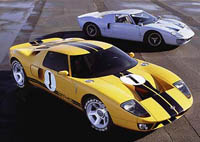Malaysia cuts taxes on imported cars
The Malaysian government reduced taxes on most imported vehicles under a new policy announced Wednesday aimed at making the country the regional auto industry hub. It also unveiled a host of other measures including a reduction in import duties on cars made or assembled in the Association of Southeast Asian Nations (ASEAN) member countries to 5 percent and a ban on import of second-hand cars by 2010.

The National Automotive Policy, announced by Prime Minister Abdullah Ahmad Badawi's office said the excise duty structure has been streamlined, "resulting in an overall reduction in the effective tax rate on most motor vehicles" imported and produced in the country.
"It is intended that the streamlining of the tax structure will promote greater transparency in pricing," the policy statement said. The new rules will become effective Thursday. The government said the increased competition spurred by lower costs of foreign cars will make the domestic car industry "viable, competitive and resilient for the benefit of industry participants, consumers and the Malaysian economy."
Malaysia is ASEAN's largest passenger vehicle market with more than 500,000 vehicles sold annually. The car market is currently dominated by the national car maker Proton and a second national company, Perodua. The two companies along with foreign makers who assemble their vehicles here account for 90 percent of the cars on the roads in the country.
Foreign cars built in Europe, Japan and the United States have been deliberately kept out of reach of most Malaysians through exorbitant excise and import taxes in a bid to protect Proton. High taxes are also imposed on locally assembled foreign cars. Despite the reductions, prices on foreign cars are not going to come down dramatically.
Excise duty for foreign cars made outside the ASEAN region will be 75 percent to 125 percent depending on engine capacity, compared to 80 percent to 200 percent previously. Import duty will stay at 30 percent. However, import duty on cars assembled in an ASEAN country has been reduced from 15 percent to 5 percent.
Through these steps, the government expects "to see an industry with two strong national vehicle manufacturers, complemented by a number of foreign vehicle manufacturers," the policy statement said. It said the domestic and foreign car makers will hopefully "upscale their assembly operations and at the same time rationalize the models assembled, to drive sustainable industry linkage."
The policy on ASEAN-made cars is in line with Malaysia 's commitment to reduce import duties on them before Jan. 1, 2008 , under the ASEAN Free Trade Area agreement. This move is expected to benefit foreign car makers that assemble their vehicles in neighboring Thailand , Indonesia and the Philippines . The policy statement said the different excise duty rates for cars, multipurpose vehicles and four-wheel drives has been narrowed.
It said a controversial policy of giving permits to a select few companies and individuals to import foreign cars will also be phased out by Dec. 31, 2010 . The permits are given only to ethnic Malays, as part of a policy to promote them economically.
In another significant change, the government said no new manufacturing licenses will be given to set up assembly lines for the time being because of overcapacity in the country. Existing assemblers will also not be allowed to lease their lines to other companies that make models competing with domestic cars, it said, reports the AP.
N.U.
Subscribe to Pravda.Ru Telegram channel, Facebook, RSS!




